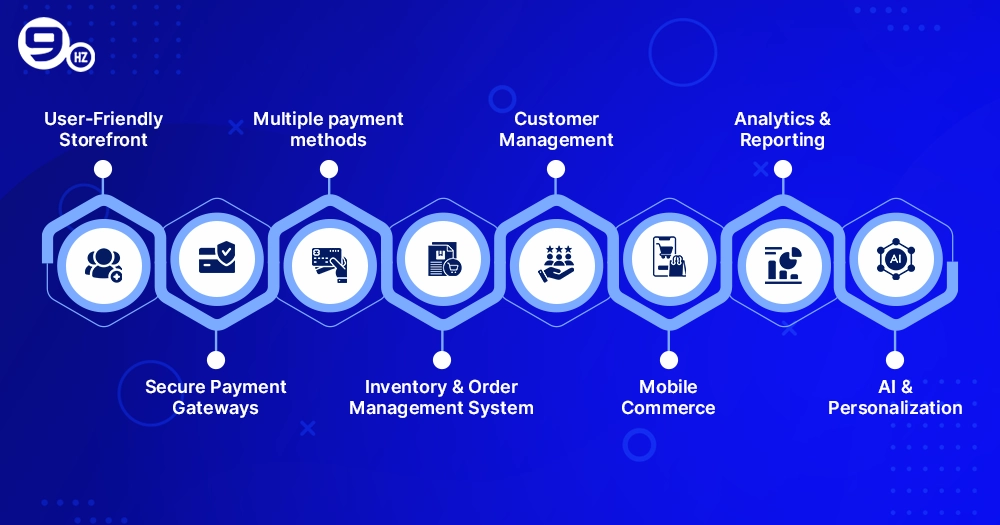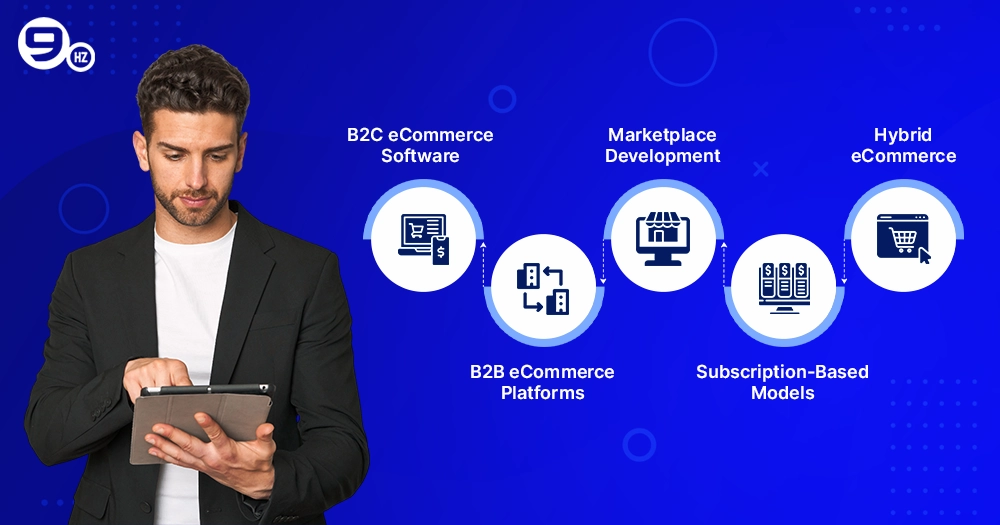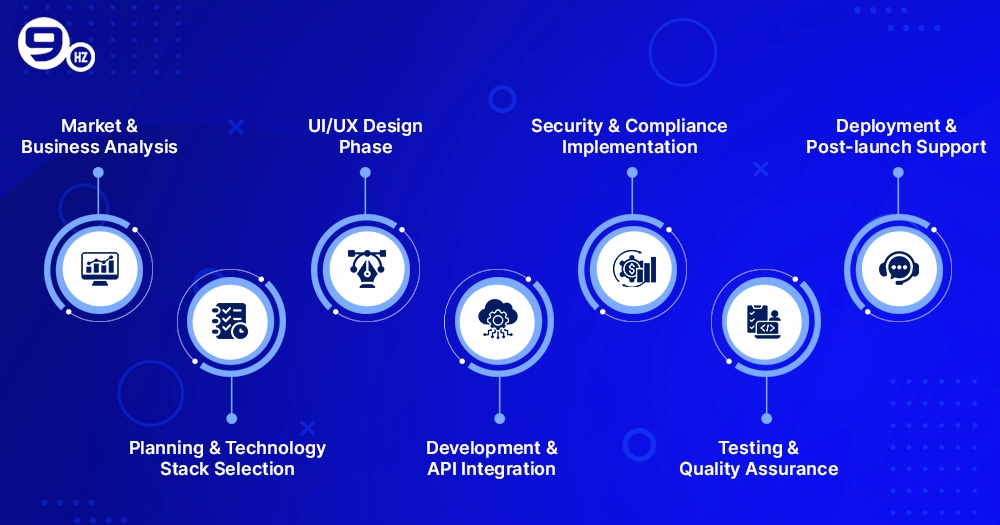It would be great to walk into a store where every item fits your style, price, and wants. That’s the magic that new ecommerce software development makes for online companies. A study states that the market size of the worldwide ecommerce industry will reach $8 trillion by 2027, up from $6 trillion in 2024. This number shows not only growth, but also how vital eCommerce businesses are to the world economy at large.
Online shopping is no longer a nice-to-have; it’s a must in today’s digital world. Customers expect online shopping to go smoothly, with e-commerce sites that load quickly, safe payment gateways, and personalized suggestions. Companies that only use basic online store builders often have trouble growing. The big ecommerce software development companies, on the other hand, stay ahead because it gives them more freedom, lets them customize it, and automates tasks.
Businesses can easily add to their catalogs, control their goods in real time, automate order management systems, and provide excellent customer engagement with the help of well-structured ecommerce software development. Additionally, custom ecommerce development helps businesses connect with customer expectations while planning for future growth by reducing repetitive tasks, increasing operational efficiency, and empowering them to do so.
You’ll learn the following in this blog:
- What eCommerce software development in 2025?
- Why businesses need custom solutions to be able to grow in the long run.
- Strong ecommerce solution characteristics.
- Various ecommerce platforms and their applications.
- Advice on how to choose the best ecommerce software development company.
You’ll know how custom ecommerce development services can make your online business a customer-focused powerhouse that lasts by the end.
What is eCommerce Software Development?
The process of creating, merging, and managing the software that runs an online store is at the heart of ecommerce software development. Building tools for payment processing, customer management, inventory management software, marketing automation, and data are all part of it.
A skilled ecommerce software development company builds a complete ecommerce solution that is tailored to specific business goals rather than just creating a website. Aligning software design with customer engagement strategies, adding third-party tools, and ensuring compliance with global security standards like PCI DSS and GDPR are all part of this.
Off-the-Shelf vs Custom-Built Solutions
Businesses often have to choose between off-the-shelf systems and unique builds when they need ecommerce development services.
- Pre-built tools like Shopify, WooCommerce, or Adobe Commerce (Magento) are cheap and easy to use. They let business owners quickly set up a basic online store, even if they don’t know much about computers. These systems can impose limits on size, customization, and advanced linkages as an eCommerce business grows, though.
- Alternatively, bespoke ecommerce software development is happening. It can be tailored to your needs through the following features: improved inventory management, easy integration with Customer Relationship Management (CRM) and Enterprise Resource Planning (ERP), and custom process support. An example is a clothing store that may require AI-driven predictive analytics to adjust the price in response to demand, or a business-to-business (B2B) dealer may require tailor order management systems and processes to make large purchases.
Role in Modern Business Growth
The development of ecommerce software is among the most critical things that online businesses can do to cope with the future. To ensure adjustments in solutions are made as the customer expectations vary, it allows the software developers to align the software development process to a specific business. When there is a lot of competition in a market, companies that invest in custom ecommerce software frequently report higher customer satisfaction, better customer retention, and more efficient operations.
Seamless, Scalable, and Secure – Get eCommerce Software Built for Success
Why Businesses Need Custom eCommerce Software
Off-the-shelf systems are satisfactory in the case of novice businesses; however, in the case of well-established companies that seek to expand in the long term, they require custom ecommerce software development services. This is why:
1. Scalability for Growing Product Catalogs and User Base
An online business with thousands of Stock Keeping Units (SKUs) and millions of users can emphasize the workload of generic eCommerce systems. Custom ecommerce development ensures that the systems that your software developers create are scalable to meet your future growth. As an example, inventory management software may be programmed to deal with importing a high volume of goods, receiving goods in warehouses, and automatically updating stock.
2. Seamless Integration with CRMs, ERPs, and Third-Party Tools
Modern ecommerce projects often combine tools, starting with marketing automation platforms and going through to supply chain solutions. Third-party integrations of custom software that ensure seamless changes across management systems, such as CRMs and ERPs, break down data walls. Reduction of redundancy in operations streamlines operations.
3. Enhanced Customer Experience with Personalization & AI
The communication with the customers has become more individualized. Companies can provide everyone with a personal experience of robots, predictive analytics, and recommendation engines powered by AI. Tailor-made eCommerce software applies consumer information in order to provide product suggestions, customized transactions, and fastened mobile commerce experiences.
4. Competitive Advantage Through Unique Features
Each ecommerce business has special requirements. Build-to-order ecommerce development offers companies the chance to be differentiated through customizations such as custom reward programs, membership billing, multi-vendor marketplace, and complex customer management systems. Ready-made tools do not provide any concrete templates.
Pro Tip: Work with a development team that values ongoing support and an ecommerce solution to make sure your ecommerce solution stays up to date with cutting-edge technologies.
Key Features of eCommerce Software Development
1. User-Friendly Storefront
The storefront is where buyers first see and connect with the business. A simple user interface makes it easy to move around, find what you’re looking for, and check out quickly. For example, Amazon’s “one-click checkout” significantly improved customer retention by making orders more straightforward. Customer satisfaction is directly improved, and sales are increased when ecommerce software is developed using best practices for UI/UX.
2. Secure Payment Gateways
Ecommerce website development must always prioritize security. Strong payment gateways can handle many currencies, banks, and even crypto payments. Detecting fraud as well as complying with the PCI DSS or GDPR contributes to the enhancement of customers’ confidence and the secure nature of payment processing. Over 73% of U.S. internet shoppers in 2025 say they like websites that make safe payment buttons stand out.
3. Inventory & Order Management System
eCommerce businesses need to have effective inventory management. Real-time updates keep the stock level stable, and automatic reorders keep the prices from going too low. With the help of integrated order management systems, companies are able to track the delivery steps, relay real-time shipping information, and enhance the entire customer experience.
4. Customer Management
Loyal customers are important to long-term sales. Such traits as personal accounts, reward systems based on the number of points, and AI-based recommendations enhance customer engagement. The customer retention in companies that invest in advanced customer management systems increases up to 40% when compared to the companies that use simple tools only.
Scale your Online Store with Next-gen eCommerce Solutions
5. Mobile Commerce
In 2024, over 65 percent of all eCommerce sales in the world were through mobile devices. In this regard, therefore, mobile commerce strategies such as the adaptable web development, development of mobile ecommerce applications, and PWAs are essential to achieve the mobile shopping engagement. The custom solutions ensure that your brand provides the users with a smooth, app-like experience even in networks with low speed.
6. Analytics & Reporting
Without fact-based ideas, it is difficult to get better. Advanced analytics built into ecommerce software supplies sales tracking data, customer journey maps, and A/B testing data. These tools allow improving the process of ecommerce development and aligning it with the long-term business objectives.
7. AI & Personalization
All the chats, as well as altering price models, are improved with AI. As an example, Netflix’s subscription model applies AI to make each customer experience more personal, and eCommerce brands do the same to make suggestions. Such AI-based experiences come with quantifiable value courtesy of a bespoke system that is in compliance with your project needs.
Types of eCommerce Software Solutions
eCommerce Software development companies are of different kinds that deal with the development of solutions for different kinds of businesses. Let’s look at the main kinds:
1. B2C eCommerce Software
These systems are intended to be used in online stores and aim to provide each customer with a fun and enjoyable experience. These include clothing stores, technology names, and food delivery services. The interaction with the customers focuses on such aspects as a speedy checkout, personal savings, and simplified navigation.
2. B2B eCommerce Platforms
Unlike B2C platforms, business-to-business platforms are designed for large orders, negotiated prices, and long-lasting relationships. They assist small and medium-sized businesses in succeeding with the aid of such tools as contract prices, quote requests, and combined CRMs. Organizations such as Grainger rely on the ecommerce software development services to reach thousands of business clients.
3. Marketplace Development
The existence of marketplaces that have a high number of sellers, such as Amazon, eBay, or Etsy, performs quite well as they unite buyers and sellers into a single setting. These solutions require strong management systems, safe payment gateways, and inventory management software that can accommodate millions of SKUs.
4. Subscription-Based Models
SaaS tools, digital content services, or standard product boxes are some of the best ways to generate a reliable stream of income by using subscription eCommerce software. Examples of this include Netflix, Birchbox, and Spotify. These systems require custom ecommerce software development services in order to provide automatic payment, safety of customer data, and retention strategies.
5. Hybrid eCommerce
A hybrid strategy is a combination of the B2B and B2C, which allows businesses to sell to both big and small clients. An example is a business may have an online shop that is selling directly to end users, and at the same time, wholesalers may be able to purchase in large quantities. Under the development of custom ecommerce, the systems are designed they be flexible, scalable, and aligned with a broad business objectives.
The eCommerce Software Development Process
All great ecommerce solutions are built by an organized software development team. It is a step-by-step process that guarantees your improved completion and reduced risk, be it a simple online store or a big multi-vendor market.
1. Market & Business Analysis
The first step is to look at the project requirements, the competition, and the people you want to reach. For example, a company that wants to release a mobile commerce app needs to know what customer expectations are for mobile shopping. Business professionals in this section ensure that the software objectives match the long-term business objectives, such as expansion, client retention, or new revenue.
2. Planning & Technology Stack Selection
It is very important to pick the right technology stack. Companies that make software usually look at:
- Frontend frameworks: React, Angular, or Vue for dynamic user interfaces.
- Backend frameworks: Node.js, Django, or Laravel for reliable processing.
- Databases: MySQL or MongoDB for handling customer data and order management systems.
- Cloud hosting: AWS, GCP, or Azure for secure deployment.
Having a custom stack helps a business be flexible and ready for future growth. For example, Netflix’s use of AWS makes it easy for them to grow when demand is high.
Seamless, Scalable, and Secure– Get eCommerce Software Built for Success
3. UI/UX Design Phase
Customer satisfaction relies on a well-working and good-looking user interface. The design part involves making wireframes, mockups, and experimenting with layouts to improve the customer experience of the site. When the process of checkout is not well-planned, the failure rates of shopping carts may also increase, whereas the engagement of customers increases when the process proceeds well.
4. Development & API Integration
The development team in this case codes the key features and implements APIs to shipping, payment gateways, CRMs, and other third-party integrations. As an illustration, PayPal, Stripe, and Razorpay APIs are frequently integrated to ensure that the payment processing is safer. This step, besides making features such as inventory management software and reward programs, also involves the addition of the same.
5. Security & Compliance Implementation
Cybersecurity is of great concern to every online business. Custom e-commerce software development includes encryption techniques, multi-factor authentication, and the enforcement of the GDPR/PCI DSS. Besides being costly, data breaches cause loss of customer confidence and the loss of customers in the long term.
6. Testing & Quality Assurance
A lot of tests are also done on the app before it is launched to make sure it functions well across all mobile devices, sites and regions. Early bugs are discovered in functional, security and speed testing. The lack of comprehensive QA may lead to issues in satisfying the customers and user reviews.
7. Deployment & Post-Launch Support
When the system is tested, it goes on particular cloud computers. This is not the end of the work, though. To be successful in the long term, the software development company should maintain continuous monitoring, modifications, and maintenance. Businesses should also learn to utilize the latest and updated technologies, such as Bitcoin and augmented reality, as a means of planning future expansion.
Pro Tip: Focus more on a development model that encompasses maintenance after launch. This will save you money and ensure that your platform will be able to keep up with the latest trends of the market.
Cost of eCommerce Software Development
The number of things that influence the cost of custom ecommerce software development is large.
1. Factors Influencing Development Costs
- Development team location & expertise: Most of the time, software developers in the U.S. or Europe charge more than those in Asia or Eastern Europe.
- Technology stack: Prices can increase in case you use sophisticated platforms or systems operated by AI.
- Feature complexity: The cost of a simple eCommerce site is lower than a multi-vendor marketplace that is AI customized.
- Custom integrations: ERP, CRM, or other sophisticated management systems require more development time to add.
2. Approximate Cost Range for 2025
The cost of the custom eCommerce software development relies greatly on the features, connections, and level of skill of your development team in 2025, and the complexity of the project. The larger business developmental costs are more due to the increased complexity of AI, analytics, and multi-provider capability that the bigger business requires. Smaller companies may only need a basic online store.
| Project Type | Cost Range (2025) | Key Highlights |
|---|---|---|
| Basic Online Store | $20,000 – $40,000 | Ideal for startups; includes product listings, basic checkout, and secure payment gateways. |
| Medium-Sized eCommerce Projects | $50,000 – $120,000 | Scalable platforms with inventory management software, advanced UI/UX, and third-party integrations. |
| Enterprise-Level Development | $150,000 – $500,000+ | Full-scale custom ecommerce software with AI personalization, multi-vendor support, and advanced management systems. |
These numbers may seem high, but the long-term benefits of engaging in custom eCommerce software include increased customer retention, decreased repetitive tasks, and better alignment with changing customer expectations.
Future Trends in eCommerce Software Development
ECommerce is evolving at a very rapid pace. When it comes to retaining customers and earning more money, early adopters of new solutions have an advantageous position. The following are the most important trends that will define the development of ecommerce in 2025:
1. AI-Driven Personalized Shopping Experiences
AI is transforming customer engagement. The way brands are leveraging AI to satisfy customer expectations is diverse and can include predictive analytics and extremely personalized product recommendations. According to McKinsey, custom will introduce an additional 15% sales.
2. Voice Commerce & Chatbot-Driven Purchases
Voice assistants such as Alexa and Google Assistant are making online shopping a different experience. By incorporating talk eCommerce into ecommerce, customers are in a position to make orders without using their hands. Similarly, AI applications enhance customer satisfaction and decrease the number of repetitive processes.
3. Blockchain & Crypto Payments Adoption
Digital currencies are becoming more famous, with more ecommerce businesses including crypto in their payment gateways. Blockchain assures transaction security, reduces fraud, and facilitates the growth of the world.
4. AR/VR Virtual Try-Ons for Products
Augmented and virtual reality are changing the customer experience. Fashion stores take advantage of AR and enable customers to virtually try clothes and accessories. This trend reduces the number of returns and increases the level of customer engagement.
5. Omnichannel Integration Across Digital Touchpoints
The customers want to be able to shop comfortably on websites, mobile applications, and social media. Digital interaction is now a premium in ecommerce software development services to create consistent experiences that will drive customer retention.
Choosing the Right eCommerce Software Development Partner
Selecting the appropriate partner is the key to the success of your ecommerce projects. There are many software development companies. Here’s what to look for:
1. Industry Expertise
Select a collaborator who has previously collaborated with you in the eCommerce industry. As indicated by successful projects and case studies, their capability to meet the challenging project requirements is eminent.
2. Portfolio and Client Reviews
A good resume should display technical expertise in ecommerce website development, ecommerce mobile app development and tailor-made ecommerce development. Reviews by customers provide a perspective of the reliability of a business.
3. Security-First Approach
To protect the data, comply with regulations, and process payments, ensure that the company has best practices. This will assist your customers to believe in you in the long term.
4. Scalability & Post-Launch Support
The most appropriate software development firm offers after-sales services and ensures that the platform is scalable to accommodate further expansion, besides code delivery.
Pro Tip: Find business associates who emphasize strategic alliances instead of a single delivery. The ROI of long-term teamwork is always greater.
Conclusion
Businesses have many opportunities to shine and perform well in the ecommerce software development world. Developing custom ecommerce software is no longer a luxury, and its capabilities, such as scaling and frictionless connection, as well as AI-powered personalization and mobile-first designs, are also necessities.
Businesses can do the following when they hire custom ecommerce software development services:
- Customized features will make the customer experience better.
- Through automation and integration, you can make operations run more smoothly.
- Use cutting-edge technologies and innovative solutions to stay competitive.
- Long-term customer retention can be achieved by keeping up with changing customer expectations.
Generic tools frequently fall short in today’s fiercely competitive eCommerce sector. Businesses that use custom ecommerce development not only create successful projects but also make their growth future-proof.
If you want to take your eCommerce journey to the next level, you should talk to NineHertz, the best eCommerce software development company. If you have the right development team, you can make your idea a reality that is safe, flexible, and focused on the customer.
FAQs on eCommerce Software Development
1. What is the difference between custom eCommerce software and SaaS platforms like Shopify?
Although SaaS systems like Shopify can be set up fast, custom eCommerce software will allow you to scale further when needed, to access advanced functions and possess unique integrations, which help you to remain flexible going forward, as per your business intentions.
2. How long does it take to develop an eCommerce platform?
The duration of the custom ecommerce development depends on the requirements, features, and integrations, but it usually takes 4-9 months on average; nevertheless, the timeframe might also be different depending on the software development process and the expertise of the development team.
3. Is custom eCommerce software secure?
Indeed, when developed by a trustworthy ecommerce software development firm, custom solutions in development are complete with encryption, PCI DSS compliance, and other sophisticated measures of data protection to keep customer data and transactions safe.
4. Can I integrate third-party tools like CRM or ERP in custom eCommerce software?
Absolutely, the on-demand ecommerce development enables the smooth integration of third parties with the CRMs, ERPs and other tools, which consolidate the operations and bring efficiency to the management systems across the board.
5. What are the ongoing costs after launch?
Example ongoing costs include cloud hosting, upgrades, and associated ongoing support, security patches, and feature enhancements as needed to keep your ecommerce solution able to scale, ensure the highest security, and keep up with the changing trends as the market develops.
6. Is it better to build a mobile app or a web app for eCommerce?
Both avenues have their merits, though integrating ecommerce mobile application development with responsive web design will yield greater customer outreach, engagement, and mobile shopping experiences regardless of the device they are using.
Great Together!












